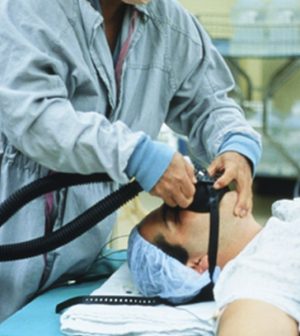- Could Your Grocery Store Meat Be Causing Recurring UTIs?
- Are You Making This Expensive Thermostat Error This Winter?
- Recognizing the Signs of Hypothyroidism
- 10 Strategies to Overcome Insomnia
- Could Artificial Sweeteners Be Aging the Brain Faster?
- Techniques for Soothing Your Nervous System
- Does the Water in Your House Smell Funny? Here’s Why
- Can a Daily Dose of Apple Cider Vinegar Actually Aid Weight Loss?
- 6 Health Beverages That Can Actually Spike Your Blood Sugar
- Treatment Options for Social Anxiety Disorder
People Tend to Overestimate Pain From Surgery

Many patients overestimate the amount of pain they’ll experience after surgery, resulting in needless anxiety, a new study reports.
“We believe providers need to do a better job of counseling patients on realistic pain expectations,” said study co-author Dr. Jaime Baratta, director of regional anesthesia at Thomas Jefferson University Hospital in Philadelphia.
The research included 223 patients. Their average age was 61. All had orthopedic, neurological or general surgery. Of these, 96 received some form of regional anesthesia (spinal, epidural or peripheral nerve block). The remaining 127 patients received only general anesthesia.
Before their surgery, the patients estimated what level of postoperative pain they expected on a 0-10 scale (10 being the most painful). After surgery, they were asked about their level of pain in the post-anesthesia care unit one hour following surgery and again on the first day after surgery.
The patients’ average expected pain rating immediately after surgery was 4.7, while their actual pain rating was 2.6. The average expected pain rating on the first day after surgery was 5.5, compared to an actual pain rating of 4.3.
Patients who had regional anesthesia had an average expected pain rating immediately after surgery of 4.6, while their actual pain rating was less than 1. The average expected pain rating for these patients on the first day after surgery was 5.5, compared to an actual pain rating of 3.5.
Patients receiving regional anesthesia “may not fully understand the benefits of nerve blocks and other regional anesthesia procedures aimed at preventing postoperative pain,” Baratta said.
The study was presented Saturday at the American Society of Anesthesiologists annual meeting, in Boston.
Study co-author Dr. Amir Dayan is an anesthesiologist who’s also from Jefferson University Hospital. “With advancements in regional anesthesia, great strides have been made in preventing postoperative pain. Given the clear benefit of patient education and anxiety alleviation on postoperative pain, providers must find ways to effectively manage patient expectations to help improve outcomes,” he said in a meeting news release.
Findings presented at meetings are usually considered preliminary until they’ve been published in a peer-reviewed journal.
More information
The American College of Surgeons has more on pain management.
Source: HealthDay
Copyright © 2026 HealthDay. All rights reserved.










